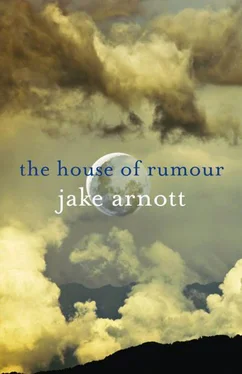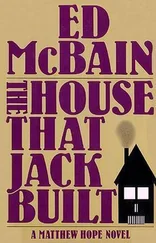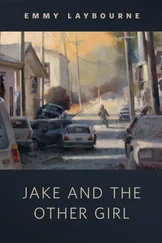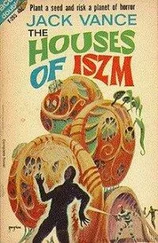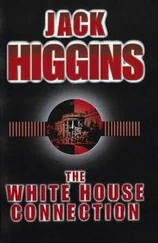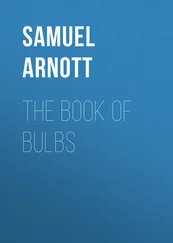I excused myself and went back downstairs. I was beginning to feel the effects of the sherry. I took a wrong turning and found myself in a utility room. I felt as if I was trapped in the labyrinthine tesseract of Heinlein’s story. I eventually found my way back to the lounge and looked around like a lost child. Hubbard caught my eye.
‘She’s outside, kid,’ he drawled with a cruel smile.
I went to the door and spied Mary-Lou by the front porch standing close to Jack Parsons. He was pointing up at the sky, tracing a constellation as he talked in a low, intense drone. I felt as if I was losing my footing and I held onto the door for support. I went back inside, walking in an absurd crouching posture. Leslyn Heinlein frowned as she handed me another glass of sherry and asked Nemesio about Mexico. He said that he was actually from Cuba. I tried hard to concentrate as he told me his story. Like many young men he insisted on a pattern to his as yet unformed life. He was always late, he concluded. He had planned to go to Spain to fight with an anarchist militia. Two days before he was due to embark from Havana, Franco marched into Madrid. He then went to Mexico to study, with the intention of meeting Leon Trotsky. He finally obtained a letter of introduction only to arrive at Coyoacán four days after Trotsky was assassinated by Ramón Mercader.
‘I think this is why I started writing about the future, so as not to be late,’ he explained with a grin. ‘But I am also interested in technological utopianism.’
He had come to LA, making contact with a disparate group of American radicals: Trotskyists, members of the Technocracy Movement and libertarians like Heinlein, who had been involved in Upton Sinclair’s End Poverty in California campaign back in the 1930s.
The party was beginning to break up. Mary-Lou came back into the lounge.
‘Larry,’ she said, somewhat breathlessly, ‘I’m getting a ride with Jack.’
‘But, but, Mary-Lou,’ I slurred. ‘I thought I was driving you home.’
‘It’s okay, Larry. You’ll want to talk some more.’ I remember the way her eyes sparkled as she said: ‘Hasn’t it been a wonderful evening?’
Then she was gone. My recollection of the evening after that begins to jump around. Leaps in time and space. I was in the kitchen helping myself to another drink. Joining in with a dirty limerick recitation ( There once was a fellow McSweeney/Who spilt some gin on his weenie/Just to be couth/He added vermouth/And slipped his girlfriend the martini ) . Throwing up in a plant pot. Collapsing onto the couch in the lounge.
The following morning’s hangover was ghastly, augmented by wretched feelings of guilt and humiliation. I apologised to the Heinleins for my behaviour. Leslyn was certainly annoyed with me but Robert just laughed it off and plied me with strong black coffee. Nemesio had also stayed over, sleeping in the spare room in a more planned and civilised fashion. I gave him a ride downtown to where he was lodging with an elderly couple who worked for the League for Industrial Democracy.
When I confided to him about Mary-Lou he gave a long sigh.
‘ Siempre ,’ he declared. ‘With love it is always hard.’
Nemesio always seemed older than his years. He was actually a few months younger than me but from the start he assumed a sense of seniority in our friendship. I never minded this. He was, after all, far more mature than me in so many ways. He gave me a political awareness and something of a sentimental education. We had experiences in common that acted as a kind of emotional bond: we had both grown up without fathers. We agreed that we would see each other at the next LASFS meeting.
After dropping him off I went home and spent the rest of the day trying to ease a blinding headache and to placate my mother who, having waited up for me in vain, had spent the previous night phoning hospitals and police stations, certain that I had become the victim of some gruesome incident.
For the next few days I stayed indoors, struggling to write but mostly brooding about Mary-Lou and Jack Parsons. I found myself rereading an article on his rocket experiments that had appeared in Popular Mechanics the previous fall. His handsome face taunted me as it stared out of photographs between illustrations of test sites and diagrams of launch trajectories. Thursday came around and I went along to Clifton’s. I tried to clear my mind of it all but before long I was talking about Jack Parsons. And there was plenty of gossip about him. It was said that he was married, though he and his wife took other lovers; that he was actively recruiting for the Ordo Templi Orientis, hosting discussion groups on literature and mysticism at his home in Pasadena. There were stories too of parties at the OTO Lodge, tales of spiked punch, near orgies and invitations for all to join in the Gnostic Mass in the attic temple.
Luckily Nemesio turned up and managed to distract me from my wild imaginings. He had already acquired the nickname ‘Nemo’ from the LASFS crowd, which would become his name from then on.
‘It’s a good one,’ I told him. ‘Like Verne’s submariner in 20,000 Leagues Under the Sea .’
‘It also means “no one”,’ he replied with a shrug.
He then went on to recount his theory of how Verne had based his Captain Nemo on the nineteenth-century submarine inventor from Barcelona, Narcís Monturiol.
‘Narcís?’ I retorted. ‘Hubbard’s right, you know, what is it with these Spanish names?’
‘Well, he was Catalan, actually. But, you know, Narcís Monturiol was a visionary, a true exponent of liberational technology. He had written many pamphlets on socialism, pacificism, feminism even. He supported the setting up of utopian communes in the New World. When that failed he became interested in science and technology. His was the first fully functional submarine.’
‘Well, a lot of guys on the Atlantic convoys won’t thank him for that.’
‘Yes, but his was a craft for exploration.’ Nemesio began to sketch the design of an underwater craft on a napkin. ‘A pilot ship for mankind’s journey into the unknown. And his ideas then were still in advance of what the Nazis have now. He developed an independent underwater propulsion system, with a chemical fuel that could generate enough energy to power the vessel and produce oxygen as a side product. It was truly remarkable.’
Nemo showed me his drawing. It was of a fish-shaped craft with a row of portholes along its side.
‘It looks like a spaceship,’ I remarked.
‘Yes,’ Nemo agreed. ‘Maybe that’s what it was. Maybe that is the answer. If you can’t change the world, build a spaceship.’
When I walked out of Clifton’s that night Mary-Lou was waiting for me. She was wearing slacks and a windcheater with the collar turned up. She looked like a fugitive.
‘Hi, Larry,’ she said. ‘Can we talk?’
We found a bar on South Broadway. We ordered beer and I went to the payphone to call Mother.
‘She gets worried if I’m late home,’ I explained.
‘You’re such a good boy, Larry,’ she said.
I know now that this was meant tenderly but at the time it was like a jab in the gut. I made my call and then we found a quiet booth. Mary-Lou looked different, her face pale and ethereal, her eyes intense. All at once she began telling me of the strange new things she had learnt, about the Ordo Templi Orientis and its peculiar English Hierophant, Aleister Crowley. She spoke of the power of the will and the gaining of universal knowledge through symbolic ritual.
‘Remember that night when I said that I wanted to know everything?’ she said, her eyes burning beneath the neon light. ‘Well, now I think I can.’
‘But that’s crazy, Mary-Lou.’
Читать дальше
